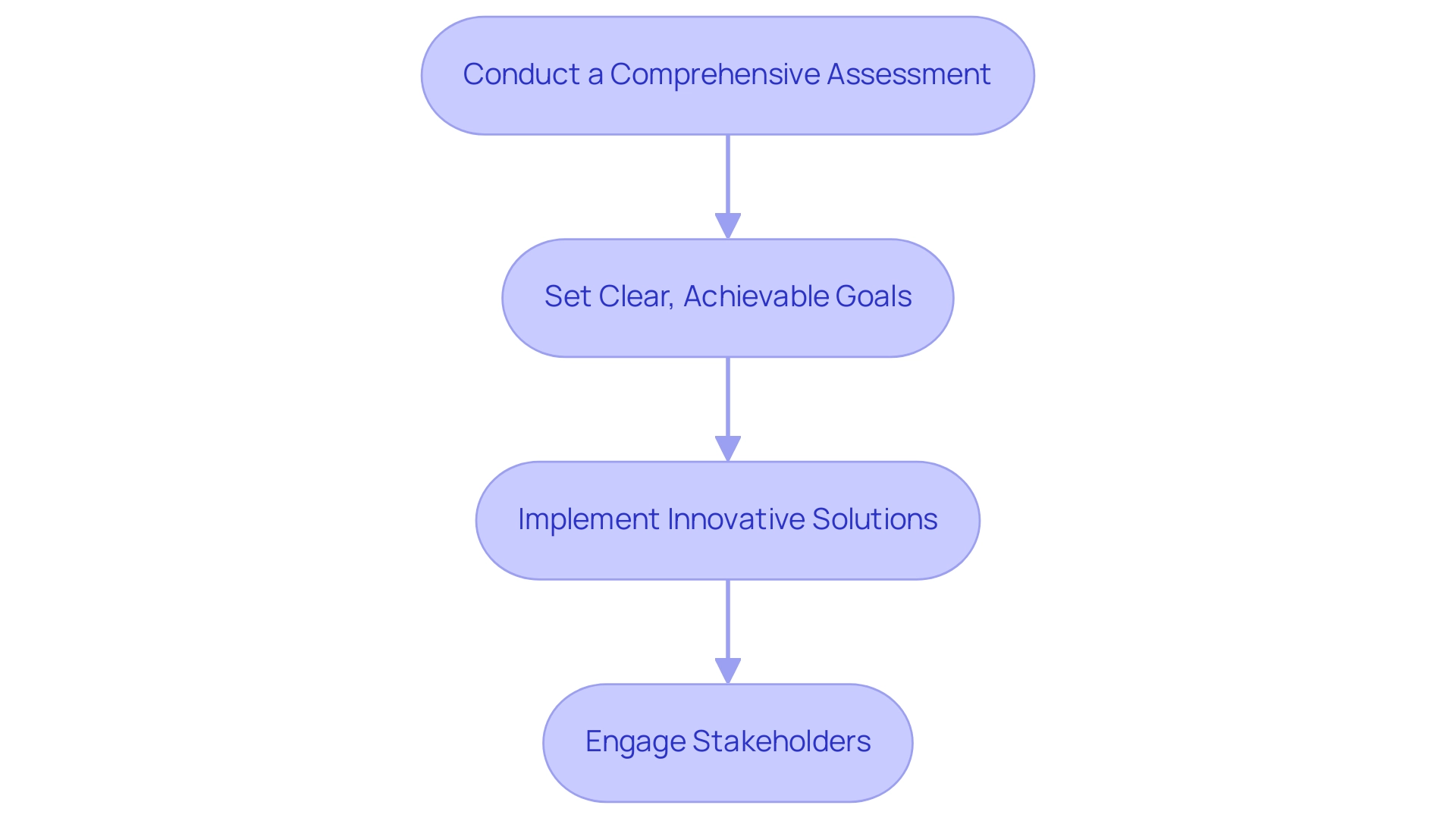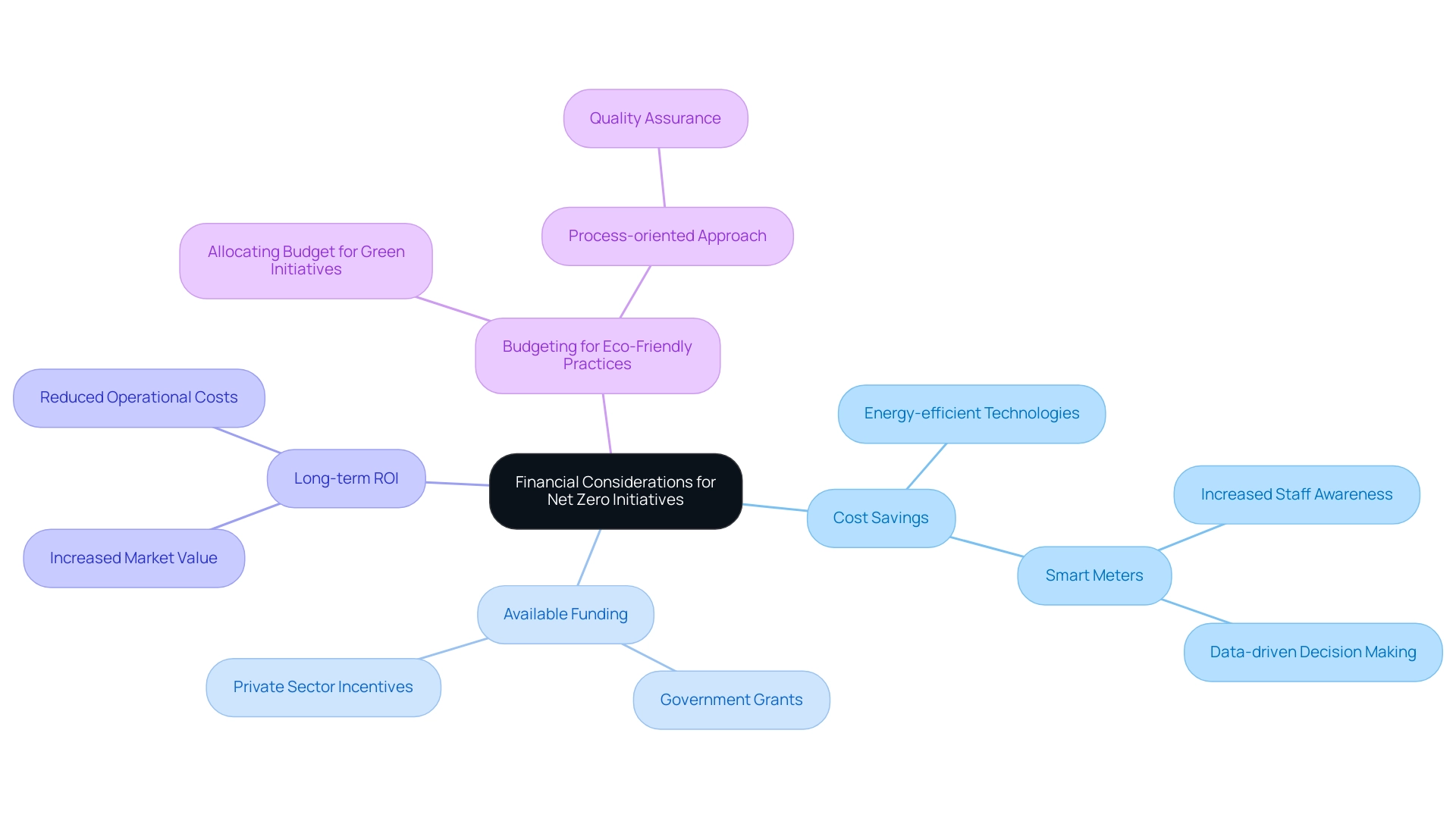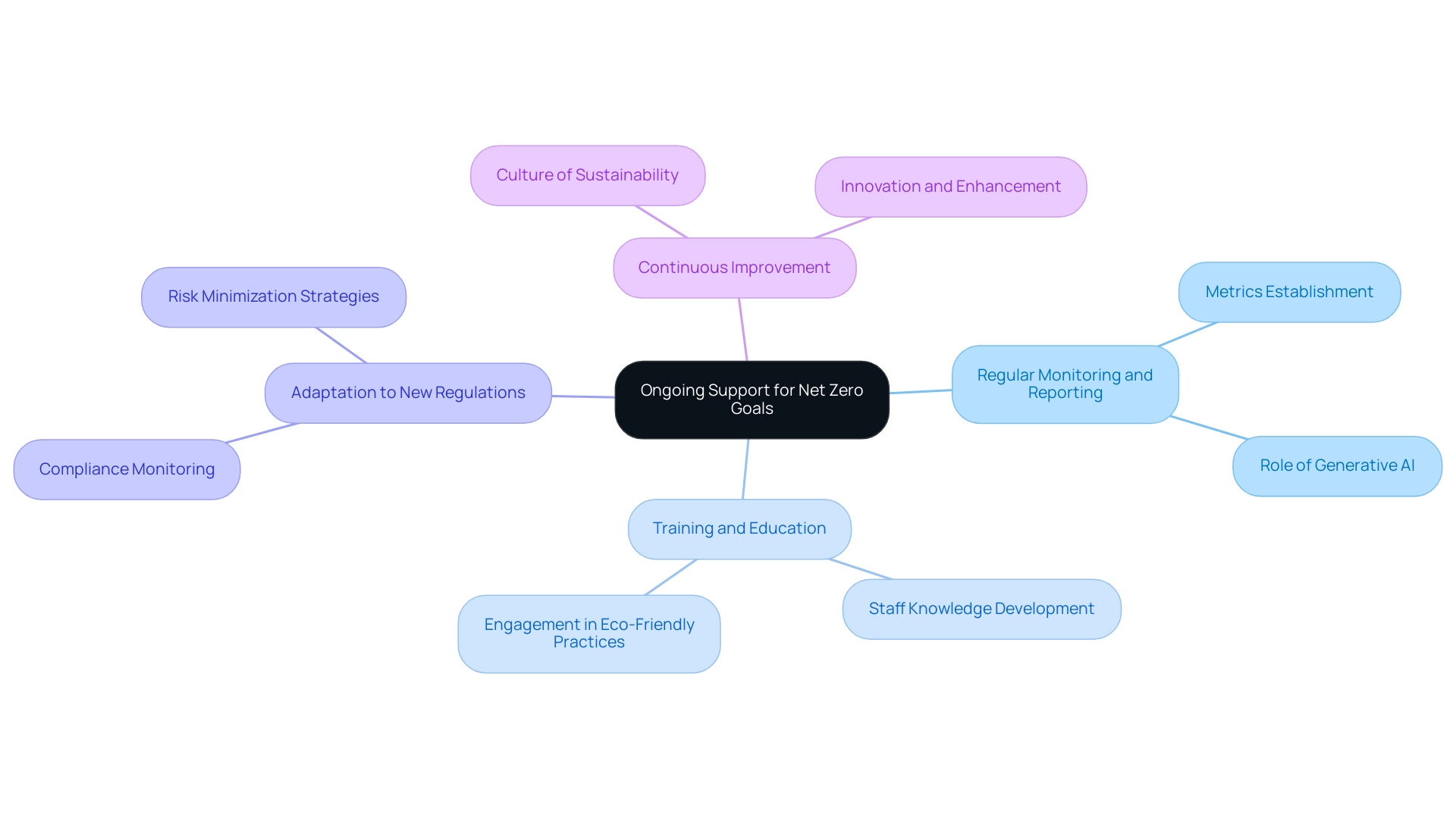27 Mar 2025
BlogOverview
The role of a net zero consultant is crucial for hospitality developers, as it directly addresses the pressing need to reduce carbon footprints and enhance energy efficiency in pursuit of sustainability goals. These consultants provide invaluable support through:
- Comprehensive carbon footprint assessments
- The application of sustainable design principles
- Adherence to regulatory compliance
- Ongoing assistance
This multifaceted approach not only aids developers in meeting their environmental objectives but also positions them as leaders in the vital movement towards a Net Zero Carbon future. By engaging with a net zero consultant, developers can ensure they are not only compliant with current regulations but are also pioneering innovative practices that set them apart in a competitive market.
Introduction
As climate concerns escalate, the hospitality industry finds itself at a pivotal crossroads where sustainability is not merely an option but an imperative. Developers are increasingly tasked with aligning their projects to meet net zero goals, making net zero consulting a fundamental element of success. This guide explores essential strategies and the myriad benefits of integrating sustainability into hospitality development. It underscores the significance of:
- Carbon footprint assessments
- Innovative design principles
- The ongoing support of expert consultants
By adopting these practices, hospitality developers can significantly reduce their environmental impact while simultaneously enhancing their brand reputation and operational efficiency. Ultimately, this paves the way for a greener future within the industry.
Understanding Net Zero Consulting: A Foundation for Hospitality Developers
A net zero consultant plays a crucial role for businesses striving to balance their greenhouse gas emissions with those they can effectively eliminate from the atmosphere. For hospitality developers, this means designing buildings and operations that significantly reduce carbon footprints while enhancing energy efficiency. Edmond Shipway’s Mechanical and Electrical Consultants specialise in building services that prioritise energy efficiency and the reduction of CO2 emissions, providing essential support for achieving net neutral objectives.
The core components of net zero consulting include:
- Carbon Footprint Assessment: The initial step involves a comprehensive evaluation of current emissions to establish a baseline. Understanding these metrics is vital, as recent statistics reveal that the hospitality industry faces increasing pressure to report and manage carbon footprints, with many establishments confronting new regulatory requirements in 2025.
- Sustainable Design Principles: Implementing energy-efficient systems and integrating renewable energy sources are critical strategies. By adopting these principles, developers can not only comply with environmental standards but also enhance the overall guest experience, as modern travellers increasingly seek eco-friendly accommodations. Edmond Shipway’s cost consultancy integrates energy efficiency into construction projects, ensuring that environmental responsibility is a foundational focus from the outset.
- Regulatory Compliance: Navigating local and international environmental regulations is essential for successful project planning. As the regulatory landscape evolves, staying informed about these regulations will assist developers in avoiding potential pitfalls and capitalising on funding opportunities, such as regional council funds and zero-interest loans, which are particularly advantageous for small and medium-sized enterprises.
By mastering these fundamentals, developers in the sector can effectively navigate the complexities of sustainable construction and operation, positioning themselves as leaders in the movement towards a Net Zero Carbon future. Case studies demonstrate that early adoption of carbon footprint reporting not only enhances a hotel’s reputation but also attracts guests and retains employees, ultimately fostering a more sustainable and competitive business model. The benefits of proactive carbon footprint management are evident, as highlighted in the case study titled “Advantages of Carbon Footprint Reporting for Hotels.”

Benefits of Engaging a Net Zero Consultant for Hospitality Projects
Engaging a net zero consultant offers significant advantages for service industry projects, profoundly impacting both operational success and brand perception. The key benefits are as follows:
- Enhanced Brand Reputation: A robust commitment to sustainability resonates with eco-conscious travellers, who increasingly prioritise environmental considerations in their choices. In fact, 76% of travellers deem eco-friendliness essential when making travel decisions, indicating that service providers adopting environmentally friendly practices can capture a growing market segment. This trend is further evidenced by the ecotourism industry’s expansion, which surpassed £172.4 billion in 2024, reflecting a substantial consumer shift towards eco-friendly accommodations.
- Operational Efficiency: Net zero consultants excel at identifying opportunities for energy savings, leading to significant reductions in operational costs. For example, properties implementing energy-efficient systems frequently experience a notable decrease in utility expenses, bolstering their financial performance. Edmond Shipway’s extensive experience in management and cost consultancy within the hospitality sector further enhances operational efficiency, as illustrated in key case studies where initiatives valued at £18.5 million and £252 million achieved considerable cost savings and environmental goals.
- Access to Funding: Numerous grants and incentives are available for initiatives that align with sustainability criteria. By collaborating with a net zero consultant to navigate these funding opportunities, hospitality developers can bolster their financial viability and commitment to eco-friendly practices.
- Risk Mitigation: Proactively addressing environmental impacts not only aligns with regulatory requirements but also mitigates the risk of potential fines and penalties. This forward-thinking strategy safeguards a brand’s reputation and ensures compliance with evolving environmental standards.
These advantages not only fortify a project’s success but also position developers as pioneers in sustainability, enhancing their brand reputation in an increasingly competitive market. As the service industry evolves, the integration of sustainable practices is becoming a defining characteristic of successful brands, making the role of net zero consultants, like those at Edmond Shipway, more critical than ever.
Crafting a Tailored Net Zero Strategy for Hospitality Development
Creating a tailored strategy for hospitality development with the assistance of a net zero consultant necessitates a systematic approach that encompasses several essential steps.
- Conduct a Comprehensive Assessment: Start by evaluating the current environmental impact. This assessment should pinpoint specific areas for improvement, establishing a clear baseline for future enhancements.
- Set Clear, Achievable Goals: Establish precise emissions reduction targets that are both ambitious and attainable. These goals must align with the overarching vision of the initiative, ensuring that sustainability is woven into every phase of development. Engaging stakeholders effectively is crucial for a net zero consultant. Collaborate with architects, engineers, local authorities, and community members to ensure that all components align with net zero objectives. This collaborative approach fosters a sense of ownership and commitment among all parties involved.
- Implement Innovative Solutions: Leverage cutting-edge technologies and sustainable practices to enhance the initiative’s environmental performance. This may include the integration of smart building systems, renewable energy sources, and energy-efficient designs that collectively contribute to reducing the carbon footprint. Edmond Shipway serves as a net zero consultant, specialising in offering consultancy services that focus on innovative solutions, ensuring that developers in the lodging industry can effectively implement strategies that align with their eco-friendly objectives.
The financial significance of enduring practices is highlighted by the anticipated £315 billion input to clean energy investments in the United Kingdom, showcasing the increasing relevance of such initiatives in the service industry.
By adhering to these steps, developers in the service sector can formulate robust, tailored strategies that not only achieve emissions reduction goals for 2025 but also position their initiatives as frontrunners in responsible development. The importance of stakeholder involvement cannot be overstated, as it ensures that the net neutral initiatives are supported and executed efficiently, ultimately leading to successful project outcomes.

Financial Considerations: Cost Savings and Support for Net Zero Initiatives
When pursuing net zero initiatives, collaborating with a net zero consultant is essential for addressing financial considerations. Key aspects include:
- Cost Savings: The adoption of energy-efficient technologies can lead to substantial reductions in utility expenses over time. For instance, hotels that implement smart metres have reported increased staff awareness of energy costs, enabling data-driven decision-making that enhances operational efficiency.
- Available Funding: A variety of grants and incentives are available for projects that align with environmental criteria, significantly offsetting initial investment costs. Developers can explore government-backed funding programmes or private sector grants aimed at promoting energy-efficient upgrades. These funding opportunities are crucial for developers aiming to incorporate eco-friendly practices without straining their budgets.
- Long-term ROI: Investments in environmentally friendly approaches not only contribute to ecological objectives but also yield long-term financial advantages. Properties that collaborate with a net zero consultant to embrace net zero initiatives often see increased market value and reduced operational costs, making them more attractive to potential investors and guests alike. The economic and environmental benefits of incorporating energy-efficient systems in hotel operations further reinforce this argument.
- Budgeting for Eco-Friendly Practices: It is advisable for developers to allocate a portion of their budget specifically for green initiatives. This proactive approach ensures that ecological balance remains a priority throughout the project lifecycle, facilitating the successful integration of energy-efficient systems and practices.
By carefully considering these financial aspects, developers in the service industry can consult a net zero consultant to achieve a balance between budget limitations and the pursuit of net zero goals, ultimately improving both their operational efficiency and their contribution to a sustainable future. Edmond Shipway’s consultancy services can provide valuable advice from a net zero consultant perspective in navigating these financial considerations and implementing effective strategies for environmental responsibility.

Ongoing Support: Ensuring Successful Implementation of Net Zero Goals
Continuous assistance from carbon-neutral advisers is essential for successfully achieving environmental goals in the service sector. This support encompasses several key areas:
- Regular Monitoring and Reporting: Establishing robust metrics is crucial for tracking progress toward sustainability goals. This enables hospitality developers to make informed adjustments as necessary, ensuring that initiatives remain aligned with their net zero targets.
- Training and Education: Equipping staff with essential knowledge and resources is vital for the long-term maintenance of eco-friendly practices. Ongoing education fosters a workforce that is not only aware of ecological principles but also actively engaged in their application.
- Adaptation to New Regulations: The environmental landscape is continually evolving, with new regulations emerging regularly. A net zero consultant plays a critical role in keeping organisations informed about these changes, ensuring compliance and minimising risks associated with non-adherence.
- Continuous Improvement: Cultivating a culture of sustainability within the organisation encourages ongoing innovation and enhancement. This proactive approach not only boosts operational efficiency but also positions the developer as a leader in sustainable practices within the sector.
By obtaining continuous assistance from a net zero consultant, developers in the service industry can ensure that their eco-friendly initiatives are efficiently executed and maintained over time, ultimately resulting in improved project outcomes and a greater commitment to environmental stewardship. Edmond Shipway’s emphasis on high-quality services and robust client relationships positions them as a trusted net zero consultant in this sustainability journey, offering tailored consultancy solutions that address the unique challenges faced by hospitality developers in achieving their net zero objectives.

Conclusion
The integration of sustainability into hospitality development stands as a necessity and a strategic advantage in today’s environmentally conscious market. Engaging in net zero consulting empowers developers to significantly reduce their carbon footprint through thorough carbon assessments, innovative design principles, and ongoing expert support. This emphasis on sustainable practices not only enhances brand reputation but also attracts eco-conscious travellers, ultimately leading to operational efficiencies that positively impact the bottom line.
Adopting a tailored net zero strategy necessitates a systematic approach, encompassing:
- Comprehensive assessments
- Clear goal-setting
- Stakeholder engagement
- Implementation of innovative solutions
These steps are vital for navigating the complexities of sustainable development while ensuring compliance with evolving regulations. Furthermore, the financial implications of sustainability—ranging from cost savings to access to grants—underscore its role as a long-term investment rather than merely an expense.
Continuous support from net zero consultants is essential for maintaining momentum in sustainability initiatives. Regular monitoring, staff training, and adaptation to regulatory changes ensure that hospitality developers not only meet but exceed their sustainability goals. As the hospitality industry advances towards a greener future, the commitment to sustainability will distinguish successful brands and foster a culture of environmental stewardship. Embracing these principles today paves the way for a more sustainable tomorrow, positioning the hospitality sector as a leader in the fight against climate change.
Share


